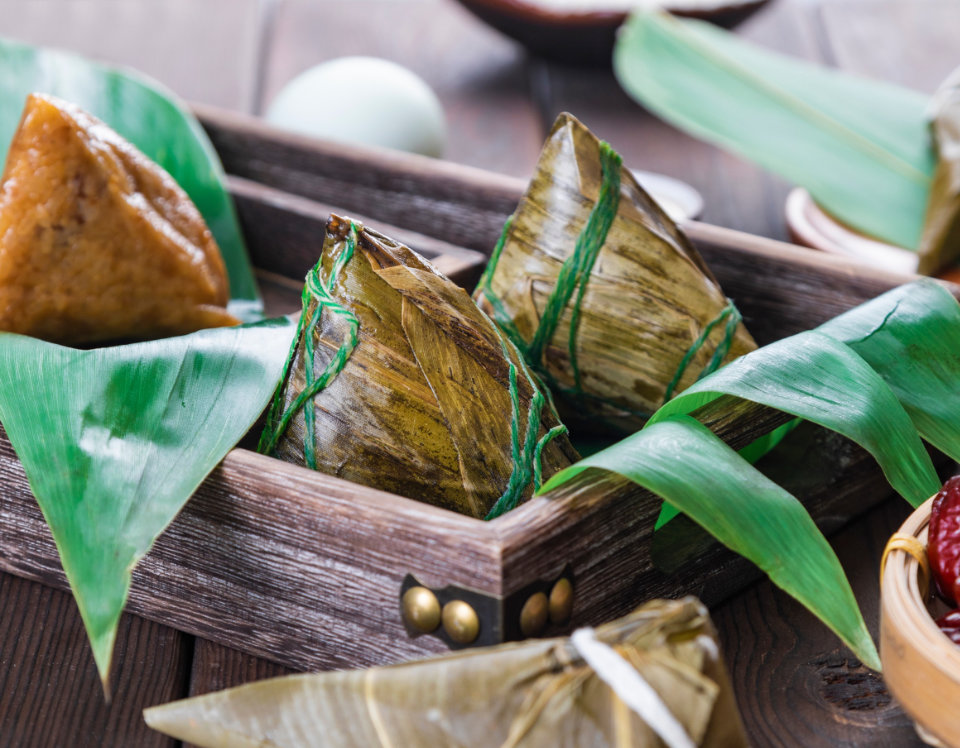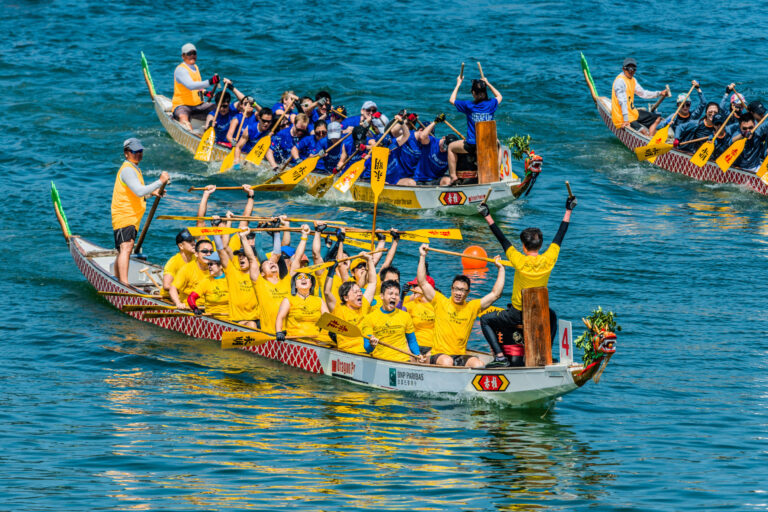The Dragon Boat Festival, also known as Duanwu Festival (端午节), is a traditional and significant celebration that occurs annually on the fifth day of the fifth month according to the lunar calendar. This festival is primarily celebrated in China, where it is considered a national holiday. However, the observance of this holiday extends beyond China’s borders.
In addition to being recognized in Mainland China, the festival is celebrated by Chinese communities worldwide, particularly in areas with significant Chinese populations such as Taiwan, Hong Kong, and Singapore.
Due to its cultural significance and unique customs such as dragon boat racing (龙舟赛) and eating zongzi (粽子), the festival has gained international attention and is celebrated in various forms in countries around the globe, including the United States, Canada, Australia, and countries across Europe.
The Dragon Boat Festival is not only a time for entertainment and vibrant celebrations, but it is also a period to commemorate history, pay respects to the famous poet Qu Yuan (屈原), and ward off evil spirits and diseases.
Hence, it’s a celebration that encompasses both cultural appreciation, ancient Chinese Feng Shui practices and communal togetherness.
Did You Know?
The Dragon Boat Festival, also known as Duanwu Festival (端午节), is not only a time of commemoration and celebration in China, but it also marked a significant global milestone in 2009. It became the first Chinese festival to be included in the UNESCO’s Representative List of the Intangible Cultural Heritage of Humanity. This list recognizes cultural traditions and practices from around the world that reflect the diversity of human heritage. The Dragon Boat Festival’s inclusion acknowledges its historical, cultural, and social significance, and highlights China’s rich cultural contribution to the world.
Table of Contents
Duanwu Festival Historical Origin and Background
The festival’s name, Duanwu, originates from the practice of people climbing to higher altitudes during midsummer to bask in the sun. The month of May marks midsummer and the first ‘wu’ (noon) day is considered the best day for such activities.
Therefore, the fifth day of May is also known as the “Duan Yang Festival” (端阳节). The festival has many other names, including the “Noon Day Festival”, “May Festival”, and “Bathing Orchid Festival”. This traditional cultural festival is celebrated not just in China, but also in countries with a significant Chinese diaspora.
The festival’s origins can be traced back to the tribes of the ancient Baiyue region (areas around the middle and lower reaches of the Yangtze River and to its south) who initially celebrated the festival as part of their dragon totem worship rituals.
The tribes would hold dragon boat racing events in honor of their tribal totem on the fifth day of May, according to the lunar calendar.
Inclusion in Cultural Heritage
In the present day, the Dragon Boat Festival is recognized as one of the four major traditional festivals of the Han Chinese, alongside the Spring Festival (春节), Qingming Festival (清明节), and Mid-Autumn Festival (中秋节).
The festival is characterized by dragon boat races and the eating of zongzi (sticky rice dumplings). It has been a national public holiday since 2008, was included in the first batch of National Intangible Cultural Heritage by the State Council in May 2006, and was added to UNESCO’s list of Intangible Cultural Heritage of Humanity in September 2009.
Theories of the Dragon Boat Festival Origins
There are many theories about the origin of the Dragon Boat Festival:
- The Historical Figures Theory (历史人物纪念说) suggests the festival commemorates historical figures, primarily Qu Yuan, a poet from the State of Chu who committed suicide by drowning in the Miluo River on this day during the Warring States period.
- Scholar Wen Yiduo proposed the Dragon Totem Worship Theory (龙图腾崇拜说), suggesting the festival originated from the ancient Baiyue tribes’ dragon totem worship rituals.
- The Evil Day Theory (恶月恶日说) posits that the Dragon Boat Festival originated from a day seen as evil, as discussed in Zhang Xinqin’s “Dragon Boat Festival is not due to Qu Yuan”.
- The Summer Solstice Theory (夏至节说), suggested by Liu Deqian, proposes that the Dragon Boat Festival originated from the Summer Solstice.
Verification of Theories and Archeological Findings
Upon verification, it was found that the tradition of dragon boat racing existed even before Qu Yuan. Research into the region of Wu and Yue revealed that even before the Spring and Autumn Period, it was customary to hold dragon boat races on the fifth day of May as part of tribal totemic rites.
Furthermore, archaeological research has shown that in the vast areas of the middle and lower reaches of the Yangtze River, a unique culture marked by geometric pottery patterns existed during the Neolithic period.
This culture was associated with a tribe that worshipped the dragon as a totem, historically known as the Baiyue tribe. Their customs of cutting their hair and tattooing their bodies, living in water towns, and considering themselves descendants of the dragon was reflected in their artifacts and their daily life.
Debating the Origins of the Festival
While the festival has ancient origins, scholars have different theories regarding its true roots. These theories revolve around the commemoration of historical figures, dragon totem worship rituals, a day deemed as evil, and the Summer Solstice.
Commemoration Theory
The most widely accepted theory is that the festival commemorates historical figures like Qu Yuan, Wu Zixu, or Cao E. This theory is based on ancient texts like the “Continuation of the Qi Xie Ji” (七谐记续) by Wu Jun and the “Jingchu Sui Shi Ji” by Zong Lin.
Dragon Totem Worship Theory
Scholar Wen Yiduo proposed that the festival originated from the dragon totem worship rituals of the ancient Baiyue tribes.
According to this theory, the Baiyue used the dragon as a symbol of their tribal identity and held grand ceremonies to honor their totemic god. These ceremonies included dragon boat racing, which evolved into the custom of dragon boat racing during the Dragon Boat Festival.
Evil Day Theory
Another theory suggests that the Dragon Boat Festival originated from a day deemed as evil. Zhang Xinqin, in his work “Dragon Boat Festival is not due to Qu Yuan”, presents this theory.
Summer Solstice Theory
The last theory proposes that the Dragon Boat Festival originated from the Summer Solstice. This theory, detailed in Liu Deqian’s “Another Theory on the Origin of Duanwu”, posits that the festival is an evolution of ancient Summer Solstice celebrations.
The Ritual of Dragon Boat Racing
Dragon boat racing was a part of tribal totemic rites even before Qu Yuan (屈原). In the region of Wu and Yue, it was a custom to hold dragon boat races on the fifth day of May.
This custom can be traced back to Qu Yuan’s own poetry, where he mentioned a type of narrow and light boat used for racing, similar to a dragon boat.
Critiques of the Commemoration Theory
While many theories about the origin of the Dragon Boat Festival exist, most academics believe the theories that commemorate “historical figures” are largely a part of folklore and myth rather than historical fact.
The practice of dragon boat racing and other customs associated with the Dragon Boat Festival, such as the wrapping and eating of zongzi (粽子), existed in Chinese society long before the lifetimes of the historical figures the festival is said to commemorate.

Qu Yuan (屈原), Wu Zixu (伍子胥), and Cao E (曹娥) are indeed significant figures in Chinese history, and their stories have become deeply intertwined with the Dragon Boat Festival.
However, the festival’s traditions may predate their lives, pointing towards an even older origin linked to the agricultural calendar, totem worship, or other social and cultural practices of ancient China.
Critics of the commemoration theory argue that the historical figures were incorporated into the festival narrative at a later stage to give a moral dimension to the celebrations.
The festival, according to these critics, was first and foremost a community event involving dragon boat racing and other customs. The addition of the tales of Qu Yuan, Wu Zixu, and Cao E gave the festival a deeper, patriotic meaning that elevated the event beyond its original agricultural and totemic significance.
Despite the debate over the festival’s origins, what is certain is that the Dragon Boat Festival has evolved over the centuries into an important occasion for Chinese communities worldwide.
Today, the festival symbolizes loyalty, patriotism, and community spirit, and it continues to be celebrated with dragon boat races, rice dumplings, and other traditional customs.
Upon the fifth month, on the fifth day’s rise,
When dragon boats on tranquil waters lie,
A festival of joy under summer skies,
As swift oars stir the depths, the spirits fly.Zongzi, wrapped with love, in bamboo’s embrace,
Beneath the sun, the dragon boats we chase.
A memory of Qu Yuan’s noble grace,
In every heart, his legacy finds place.The rhythmic drumbeats echo ‘cross the shore,
As teams unite, their strength and spirit pour.
The race is not for victory or score,
But to keep alive the legends of yore.The Dragon Boat Festival, vibrant, loud,
God of Wealth.co
A celebration that makes ancestors proud.
With every stroke, every cheer from the crowd,
A cultural heritage, enduring, endowed.
What is the Dragon Boat Festival?
The Dragon Boat Festival, also known as Duanwu Festival, is a traditional holiday originating in China. It is celebrated on the fifth day of the fifth month according to the lunar calendar, featuring activities like dragon boat races and eating zongzi (sticky rice dumplings).
When is the Dragon Boat Festival celebrated?
The Dragon Boat Festival is celebrated annually on the 5th day of the 5th month according to the lunar calendar, which usually falls in June in the Gregorian calendar.
What is the origin of the Dragon Boat Festival?
The origin of the Dragon Boat Festival is multifaceted. It is linked to dragon totem worship by the ancient Baiyue tribes, the death of poet Qu Yuan, and other theories tied to historical events and figures. It’s also seen as a day to ward off evil and disease.
Why do people race dragon boats during the festival?
Dragon boat racing originated as a form of worship by ancient tribes in China who saw the dragon as a totem. It was later associated with the legend of people paddling out in boats to retrieve Qu Yuan’s body after he drowned himself in the river.
What are zongzi and why are they eaten during the Dragon Boat Festival?
Zongzi are sticky rice dumplings wrapped in bamboo leaves, often filled with meats, beans, or other fillings. They are eaten during the Dragon Boat Festival to commemorate Qu Yuan, who is said to have drowned himself in a river when his kingdom fell. The dumplings were originally intended to stop fish from eating his body.
Is the Dragon Boat Festival a public holiday?
Yes, the Dragon Boat Festival is recognized as a public holiday in China and in some other places with a significant Chinese population.
What are some common customs during the Dragon Boat Festival?
Common customs during the Dragon Boat Festival include dragon boat racing, eating zongzi, wearing silk pouches filled with herbs to ward off evil, and making and wearing medicinal sachets. For the full lists of customs around the world, find out here.
Has the Dragon Boat Festival been recognized internationally?
Yes, in September 2009, the Dragon Boat Festival was included in the list of Intangible Cultural Heritage of Humanity by UNESCO, making it the first Chinese festival to receive such recognition.
Special thanks to Fuzhou Municipal People’s Government (福州市人民政府) for fact verification.



